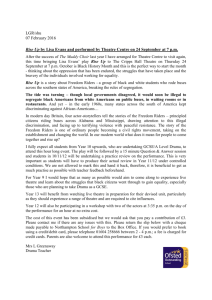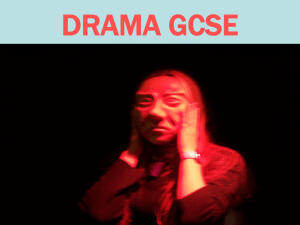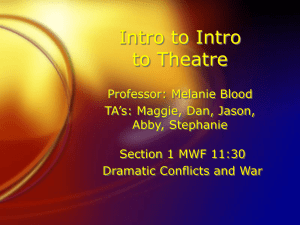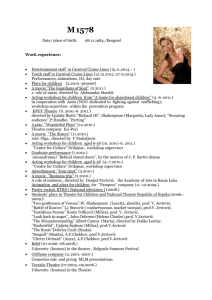View/Open
advertisement
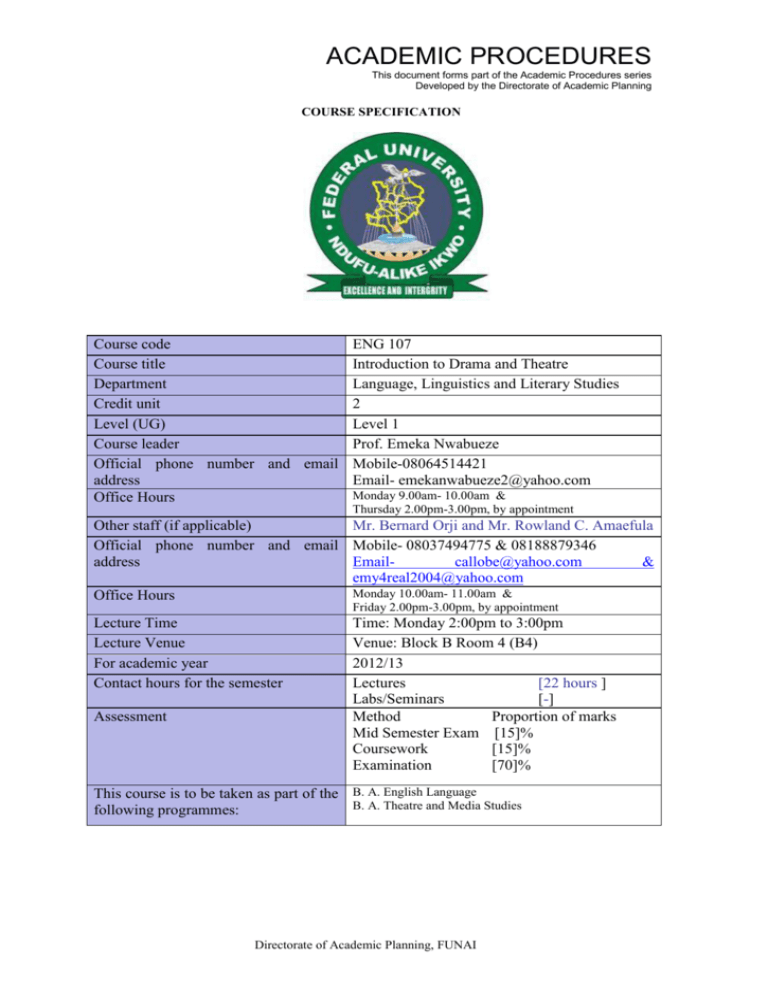
ACADEMIC PROCEDURES This document forms part of the Academic Procedures series Developed by the Directorate of Academic Planning COURSE SPECIFICATION Course code ENG 107 Course title Introduction to Drama and Theatre Department Language, Linguistics and Literary Studies Credit unit 2 Level (UG) Level 1 Course leader Prof. Emeka Nwabueze Official phone number and email Mobile-08064514421 address Email- emekanwabueze2@yahoo.com Monday 9.00am- 10.00am & Office Hours Thursday 2.00pm-3.00pm, by appointment Other staff (if applicable) Mr. Bernard Orji and Mr. Rowland C. Amaefula Official phone number and email Mobile- 08037494775 & 08188879346 address Emailcallobe@yahoo.com & emy4real2004@yahoo.com Monday 10.00am- 11.00am & Office Hours Friday 2.00pm-3.00pm, by appointment Lecture Time Lecture Venue For academic year Contact hours for the semester Assessment Time: Monday 2:00pm to 3:00pm Venue: Block B Room 4 (B4) 2012/13 Lectures [22 hours ] Labs/Seminars [-] Method Proportion of marks Mid Semester Exam [15]% Coursework [15]% Examination [70]% This course is to be taken as part of the B. A. English Language B. A. Theatre and Media Studies following programmes: Directorate of Academic Planning, FUNAI COURSE AIMS- ALIGNMENT WITH FUNAI VISION AND MISSION The course aims to produce the most innovative and respected students in Nigeria and the entire world. It is designed to provide students with professional preparation for careers by exposing them to the fundamentals of theatre and drama. The course is a mixture of history of theatre and drama and dramatic literature. This course is particularly fashioned out to install in the students a critical disposition that would aid in independent thinking towards creating a robust theatre tradition in Nigeria and beyond. INTENDED LEARNING OUTCOMES Having completed this course the student is expected to: 1. learn the labyrinths of drama and theatre in a comprehensive manner; 2. understand the difference between drama and theatre as well as the interrelationship between them; 3. demonstrate knowledge of the relationship between drama and theatre and other areas of the humanities; LEARNING AND TEACHING METHODS Teaching will mainly involve classroom lectures, completion of reading assignments, especially the recommended texts, historical developments of theatre, and ability to appreciate theatre and drama as communication. Students should be encouraged to learn through interpretation and critical analysis of dramatic texts. Finally, they should be encouraged to learn and demonstrate knowledge of the relationship between the theories applied and their influence in dramatic art and literature.. INDICATIVE CONTENT Lecture/seminar programme FUN AI Wk Lecture Session Topic/Reading for private study Tasks/Think points for private study Lecturer 1 The art of drama: its development and impact. 2 The difference between drama and theatre, their inter-relationships and impact. Historical development of drama and theatre: the Classical Age; a study of a play of the Classical Age: Oedipus the King by Sophocles. For an overview of this topic read chapter 1 of the core textbook. For an overview of this topic read chapter 2 of the core textbook. For an overview of this topic read chapter 3 of the core textbook. Prof. Emeka Nwabueze Prof. Emeka Nwabueze Prof. Emeka Nwabueze 3 Directorate of Academic Planning, Federal University Ndufu-Alike, Ikwo (FUNAI) 2 4 5 6 7 8 9 10 11 12 13 The Medieval Period, a discussion of the transition from the Classical to the Medieval period; a study of a Medieval play, Everyman. The role of drama during the renaissance; the characteristics of the renaissance age Renaissance plays in transition: Shakespeare's Julius Caesar and its influence on the age. The French Neoclassical period and its relationship with both the previous and the preceding age. Mid –Semester Examination The Genres of drama: a discussion of the major genres of drama, especially tragedy and comedy; with this week emphasizing the tragic genre. The general discussion of comedy, a full discussion of Wole Soyinka's The Trials of Brother Jero. The differences and relationships between tragedy, comedy and melodrama; the evolution of melodrama and satire. A reading of Rowland C. Amaefula’s Once Upon Abowere. some notes on traditional African festival theatre; the relationship between African traditional theatre and modern theatre; a reading of Emeka Nwabueze's Spokesman for the Oracle. General revision and application of concepts. 14 Exams 15 Exams For an overview of this topic read chapter 4 of the core textbook. Prof. Emeka Nwabueze For an overview of this topic read chapter 6 of the core textbook. For an overview of this topic read chapter 8 of the core textbook. Learning Skills Development Week Prof. Emeka Nwabueze Prof. Emeka Nwabueze Prof. Emeka Nwabueze Mid–Semester Examination For an overview of this topic read chapter 9 of the core textbook. Prof. Emeka Nwabueze For an overview of this topic read chapter 111 of the core textbook. For an overview of this topic read chapter 12 of the core textbook. Prof. Emeka Nwabueze Prof. Emeka Nwabueze For an overview of this topic read chapter 14 of the core textbook. Prof. Emeka Nwabueze For an overview of this topic read chapter 15 of the core textbook. Prof. Emeka Nwabueze Prof. Emeka Nwabueze & Mr. Bernard Orji & Mr. Rowland C. Amaefula INDICATIVE KEY LEARNING RESOURCES Core reading list Oedipus the King by Sophocles Everyman Julius Caesar by Shakespeare Directorate of Academic Planning, Federal University Ndufu-Alike, Ikwo (FUNAI) 3 The Trials of Brother Jero by Wole Soyinka Once Upon Abowere by Rowland C. Amaefula Studies in Dramatic Literature by Emeka Nwabueze Nwabueze, Emeka. The Polemics of the Dramatic Text. Enugu: Abic, 2012. Supplementary reading Brockett, Oscar. History of the Theatre. 7th ed. Boston: Allyn and Bacon, 1997. Rotimi, Ola. Our Husband has gone Mad Again. Oxford: Oxford University Press, 1977. In addition, students are encouraged to explore relevant e-journals such as: Society of Theatre Arts Journal Journal of Theatre and Media Arts (JTMA) Ibadan Journal of Theatre Arts (IJOTA) CONTINIOUS ASSESSMENT The Intended Learning Outcomes are assessed through: Assessment Mid semester Exams Coursework Semester Exams Weight 15% 15% 70% Deliverables - important dates Ensure that you make a careful note of when the assessment tasks are due in for this course. Try not to leave working on these tasks until the last minute – this is stressful for you and tends to lead to poor quality work. Remember that you have several assessments (for different courses) due the same week and you will need to plan for this. Assessment Mid semester exam- Due date Lecture session 8 Feedback & Result 14 days after the assessment Lecture session 10 14 days after the assessment Session 15 and 16 14 days after the assessment To be held at the regular class time and place Coursework Semester Exam Directorate of Academic Planning, Federal University Ndufu-Alike, Ikwo (FUNAI) 4 Feedback on your work The university is committed to providing you with written feedback for all assessed coursework within 14 days from the submission date. You will get feedback on your performance on a feedback form which will be returned to you. If you do not receive feedback within this time, then you should first contact the course leader. If it proves necessary, you should then contact the Head of Department. Submitted coursework, including your final year project, will not be returned to you. This is true for all coursework, in all courses and at all levels, and does not apply to only this course. We must keep the original copy of all coursework to provide the external examiners with a complete record of your work. Late coursework It is the University policy to accept and grade all late items of coursework (up to the published latest date for submission). There is no such thing as 'an extension'. You cannot negotiate new deadlines, and you do not need to get agreement about handing in your work late from the course leader or any other member of staff. Late coursework submissions are, however, subject to penalties (capping) that determine the maximum grade that you can achieve depending upon how late the work is. The current penalty scale can be found below: The following caps to be uniformly applied, in the absence of relevant mitigating circumstances accepted by the BoE: Up to 1 working day late Up to 2 working days late Up to 5 working days late Up to 10 working days late Up to 15 working days late More than 15 working days late Mark capped at 70% Mark capped at 60%; Mark capped at 50%; Mark capped at 40%; Mark capped at 30%; Mark capped at 0%. A working day is here defined as Monday to Friday at any time of year, with the exception of Nigeria national holidays. Students with mitigating circumstances can apply to have penalties removed via submission of the appropriate form and evidence. How to do this is explained in the Student’s Handbook. Planning your time i. Students are expected to attend all classes including seminars and laboratory sessions for each course. It is mandatory for students to have a minimum attendance of 75% in this course to be eligible to take the final semester examination. ii. Learning Skills Development Week is a break from formal subject-specific teaching activities (lectures and seminars) and applies to all undergraduate courses in the University. During that week the university offers a number of very useful free sessions on topics such as essay and dissertation writing, exam technique and job applications. You are strongly encouraged to attend sessions relevant to your studies. Directorate of Academic Planning, Federal University Ndufu-Alike, Ikwo (FUNAI) 5 iii. Note: Instructors are not required to provide mid semester examination make-up. Directorate of Academic Planning, Federal University Ndufu-Alike, Ikwo (FUNAI) 6


